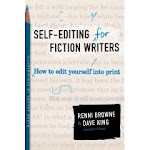Depending on how attributions are used, they can also become a form of telling.
I call the following "impossible attributions" because they create impossibilities.
Chime, deliver, breathe, repeat, seethe, spat, articulate, laugh, conclude, add, roar, state, counter, muse, roar, growl, exclaim, fume, explode, and the list goes on.
Why do these create impossibilities?
A person can't "chime, deliver, breathe, repeat, seethe, spat, articulate," a statement. These vices shout amateur to editors and agents (and if not, they should). Avoid them at all costs.
Here's a quote from Newgate Callender, in The New York Times Book Review:
Mr. (Robert) Ludlum has other peculiarities. For example, he hates the "he said" locution and avoids it as much as possible. Characters in The Bourne Ultimatum seldom “say” anything. Instead, they cry, interject, interrupt, muse, state, counter, conclude, mumble, whisper (Mr. Ludlum is great on whispers), intone, roar, exclaim, fume, explode, mutter. There is one especially unforgettable tautology: “’I repeat,’ repeated Alex.”
The book may sell in the billions, but it’s still junk.
The best thing to do with “said” is to cut it all together and replace it with an action. This will create more “showing” and less “telling.” It pulls us into the story and helps us become more acquainted with the characters. Also, as I said, if one character has dialogue and action in the same paragraph, we’ll automatically know who’s talking so there’s no need to "tell" us who's talking. But if you have to use “said,” then use “said” and not some impossible attribution that hack writers love.
I understand a writer's disillusionment after reading a published book cluttered with misused attributions. But think of it this way, would you rather be known as a writer who writes well, or as a poor writer? Sadly, hack writers get published all the time.
Yes, I'm all for breaking the rules—I talk about it regularly. There's definitely a time and a place to do it. But I believe a writer must master the rules before they can break them.
Dave King and Rennie Browne's book, "Self-Editing for Fiction Writers," goes into detail on attributions, as well as other important writing subjects.
Attributions aren't "wrong." Just use them with care.
Thursday, September 3, 2009
Subscribe to:
Post Comments (Atom)












Great post, Sandi! I remember that chapter from "Self-Editing." It took me awhile to fix problems after reading that book, but it was worth every minute.
ReplyDeleteHi Sandi, she commented.
ReplyDeleteI finally got around to bookmarking The Book Doctor.
I hope to get back soon and go through your arhives.
PS. Great book, it's on my shelf too.
Debra
Good post, you see it in stories a lot where they cried, laughed or fumed. Of course, you have to say he or she said sometimes. They say if you use it well it blends into the writing and you won't notice it.
ReplyDeleteJanet,
ReplyDeleteYes! It's true! If you use "said" well, it does indeed blend in and people don't notice it. Thank you for reminding us of this.
I agree that you must know the rules before you break them. I agree that certain dialogue tags are obnoxious at best. But I differ on particulars because people do laugh, smile, sob, spit words out, and I think it's possible for the reader to be "informed" of this when it's not apparent by the previous or post action(s). Plus, it gives the reader an extra picture or display. Once again I think "said" can not only be boring but formulaic.
ReplyDeleteAlso, it might point out "amateur" to one professional, but the agent or publisher of supposed hacks such as Ludlum or Brown don't mind the $$ those writers produce (and I haven't read either of them).
Also when bestsellers are "hacks" it tells us something about the "average" reader. They're more interested in the story than the writing.
Please don't get me wrong here. I appreciate excellent writing, but some of the "rules" used without variation end up producing formulaic and unimaginative writing.
I know this is JMO. ;)(Nicole)
Nicole—
ReplyDeleteI so appreciate your honesty about this. And just because I say one thing, doesn't mean I expect everyone to bow down and pay homage to my opinions. To be so highly exalted and admired would be awesome, though. But yeah, I live in the real world, and I don't belong on a pedestal. The fall from such a height, is great indeed!
I totally agree with you 100% about readers being more interested in the story, rather than the writing. That's really what it's all about, coming up with a great story. The one great story that will capture millions of readers. The one great story that folks can't stop talking about, that will carry through centuries of readers. As writers, don't we all wish we could be the one to write that one great story? I know I do. But while striving to create that one great story, I'd also like to be known as one great writer. I have yet to read something well-written that is formulaic or unimaginative. So, applying the "rules" correctly isn't going to harm ones prose, in my opinion.
I've also come to learn that agents and editors (most) do look for good writing. For example, if they pull your manuscript from the slush pile and see an opening paragraph that starts with "she laughed" used as an attribution, they toss it, story forgotten. I've seen it happen. However, that doesn't keep me from using them in my own work. I've got a few "spats" and "growls" in my manuscripts, but it's definitely not a habitual occurrence. I have perhaps two, maybe three, in one 300-plus page manuscript. And in all honesty, from an editor's perspective, they should all be cut and reworked. But because of the tone, the rhythm of the sentences before and after that one "impossible attribution," the prose works better with them. So, they're staying. :-) There is a time and a place to break the rules, but I admire the writer who can avoid them completely.
Sandi, I don't disagree with you, and I appreciate your tone, your insights, your information, and instructions. You get my drift, and I appreciate it.
ReplyDeleteI'd like to be considered a "good" writer, let alone a great writer, huh?
Anyway, thanks for your replies and your grace.
(Nicole)
Having only learned what beats and tags were about a year ago, I am still learning how to use them. Two things I've learned: One is to use common sense and balance. "He said" every other line is out of balance, as is the complete lack of it. Two, it can be fun trying to figure out a different beat to use that doesn't cause a speed bump for the reader. Still learning....
ReplyDeleteA J
AJHawke.blogspot.com
Nicce blog post
ReplyDelete